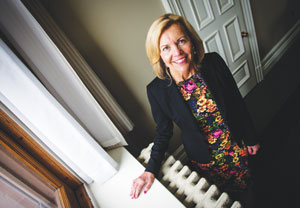There’s a good chance Ontario’s Progressive Conservative party will once again have a lawyer at its helm with frontrunners Christine Elliott and Patrick Brown both touting their legal backgrounds as an edge in the race.

MPP Christine Elliott (Whitby-Oshawa) says her current job and the one she’s applying for aren’t all that different from being a lawyer.
“In your legal profession, people pay you to solve their legal problems, but I see my role as an MPP in a very similar manner. The public pays my salary, so I owe the same duty to my constituents certainly as I owed my clients,” says Elliott, who practised real estate, corporate, and estates law at Flaherty Dow Elliott & McCarthy LLP (now Flaherty McCarthy LLP) prior to assuming political office.
Federal MP Patrick Brown, a University of Windsor law school graduate, won a seat in Parliament at a “pretty young” age, he says. After becoming an MP less than two years after opening a law office in Barrie, Brown served on the justice committee as well as an advisory committee for Supreme Court of Canada nominations.

Brown notes that coming from “a family of nine lawyers” also keeps him in tune with the issues in Ontario’s justice system. “I’ve got a sister who is an employment lawyer; I’ve got a father who’s a criminal lawyer; I’ve got an aunt who’s a family lawyer; I’ve got an uncle who is a labour lawyer; and I’ve got another uncle who did real estate and corporate law,” says Brown, whose uncle, Alberta Provincial Court Judge Ian Kirkpatrick, just retired from the bench.
“So just through my own dining room conversations, I hear a variety of perspectives,” adds Brown, whose interest in politics began when he followed then-federal Progressive Conservative leader Jean Charest around during the 1995 referendum campaign on Quebec sovereignty.
Like most lawyers in the province, both Elliott and Brown are quick to emphasize issues of access to justice. In particular, they both note their concern about delays in the justice system.
“It’s a fundamentally important issue,” says Elliott. “Our whole system rests upon the rule of law and our rule of law needs to be exercised in a timely manner. Even at a time when we have a very difficult economy, we need to look at innovative ways to advance justice in a timely manner.”
To Brown, justice issues need to attract more of what he calls “political profile.”
“I have to say that one of the reasons why access to justice hasn’t really been at the forefront of political discussions is I think it’s fair to say it has a low political profile,” he says.
“I think we’d be well served by doing more consultation, by listening to stakeholders and those who are struggling with the system because I think sometimes those who are facing the biggest challenges in the legal system are those who don’t have a voice within the political system.”
When it comes to access to justice, Elliott says she’s talking about the physical aspects as well.
“We need to use technology in the administration of justice to make courts more accessible . . . in terms of physical accessibility for people with sight and hearing difficulties,” says Elliott, who along with her late husband, former finance minister Jim Flaherty, co-founded the Abilities Centre in Whitby, Ont.
“It’s really, really important because we want to include a truly inclusive system where everyone is able to state their case and be treated as everyone wants to be treated,” she adds.
Elliott says many people come to her with issues related to the law. People will ask for help dealing with the Family Responsibility Office, for example, when its computer system can’t translate a judge’s order, causing problems with their payments. “I think there needs to be some adjustments there so that people are receiving payment on a timely basis,” she says.
Brown is more reluctant to outline the specific changes in the justice system he’ll push for if he becomes Conservative leader following the May 9 vote.
“There’s a real frustration in our party membership that we have created policy top down where leaders have announced what their policy positions are going to be prior to actually talking to stakeholders, talking to the party membership,” he says.
“I think that’s how we ended up in the debacle of the faith-based funding disaster and [former leader Tim Hudak’s] 100,000 jobs cut disaster that led to electoral mistakes,” he adds.
“My commitment is we’re going to, in a very real way, engage stakeholders and the membership before we come out with policy announcements.”
Norton Rose Fulbright Canada LLP partner Walied Soliman says Brown, a friend of his for many years, will make the party “more palatable to voters.”
“He’s done an extraordinary job driving a number of important issues to the forefront in this race, including increasing the diversity of our party and changing how our party sort of does business. So I think a number of us are very proud of his leadership style, the things that he’s trying to do to change the party and make it a more palatable choice for voters in 2018,” says Soliman, co-chairman of the Canadian special situations team at Norton Rose Fulbright.
The Conservative party needs to do a lot of reaching out, says another lawyer and Law Society of Upper Canada Bencher Julian Porter. But in his view, Elliott would be better at doing that.
Porter says he and three other benchers went to meet with Elliott at the Abilities Centre a few days after her husband’s funeral last year. She spent two hours showing him and his colleagues around the centre on a Tuesday.
Two others who were with him that day have children with disabilities, says Porter, who notes he was “vastly touched” by Elliott’s sincerity in hearing about their children and their circumstances. “She just took so much time inquiring of them and what the kids’ limitations were and what things she had there [at the centre] that would actually match the kids’ limitations. I just thought it represented an extraordinary depth of character,” he says.
“I think [Elliott] represents an ability her party must reintroduce and that’s an ability to reach out,” he adds.
“I think she’s very good at that.”
Election Ontario’s disclosure information for political contributions shows some other lawyers agree. Elliott has received donations of $5,000 from each of Impact Law LLP, Kelly Greenway Bruce, and Sandra Zisckind Law PC.
The Ontario Paralegal Association has donated the same amount to her campaign while lawyers like her former law partner Todd McCarthy have made smaller contributions.
Disclosures for Brown’s campaign show fewer donations from the legal profession, but they include Edward Goldentuler PC, which contributed $1,000, and Mann Law Barristers and Solicitors PC, which pitched in $200.
Brown and Elliott are running for the leadership at a time when the membership of the legislature includes fewer lawyers than ever before. But while there are two lawyers in the Conservative race, Elliott says what sets her apart from Brown is her years of experience practising law.
“I’ve had 25 years of actual practising legal experience. I think that makes a difference in the way that you approach things in terms of understanding the economy,” she says.
“Having been in the business world running a law practice with law partners and knowing that you have to make payroll and make decisions affecting your business, I think that’s really important for both a leader of a political party to know about as well as a potential premier.”
Besides Elliott and Brown, the leadership race also includes MPP Monte McNaughton, a businessman from Newbury, Ont. The party will hold its convention at the Toronto Congress Centre.

 MPP Christine Elliott (Whitby-Oshawa) says her current job and the one she’s applying for aren’t all that different from being a lawyer.
MPP Christine Elliott (Whitby-Oshawa) says her current job and the one she’s applying for aren’t all that different from being a lawyer. Brown notes that coming from “a family of nine lawyers” also keeps him in tune with the issues in Ontario’s justice system. “I’ve got a sister who is an employment lawyer; I’ve got a father who’s a criminal lawyer; I’ve got an aunt who’s a family lawyer; I’ve got an uncle who is a labour lawyer; and I’ve got another uncle who did real estate and corporate law,” says Brown, whose uncle, Alberta Provincial Court Judge Ian Kirkpatrick, just retired from the bench.
Brown notes that coming from “a family of nine lawyers” also keeps him in tune with the issues in Ontario’s justice system. “I’ve got a sister who is an employment lawyer; I’ve got a father who’s a criminal lawyer; I’ve got an aunt who’s a family lawyer; I’ve got an uncle who is a labour lawyer; and I’ve got another uncle who did real estate and corporate law,” says Brown, whose uncle, Alberta Provincial Court Judge Ian Kirkpatrick, just retired from the bench.